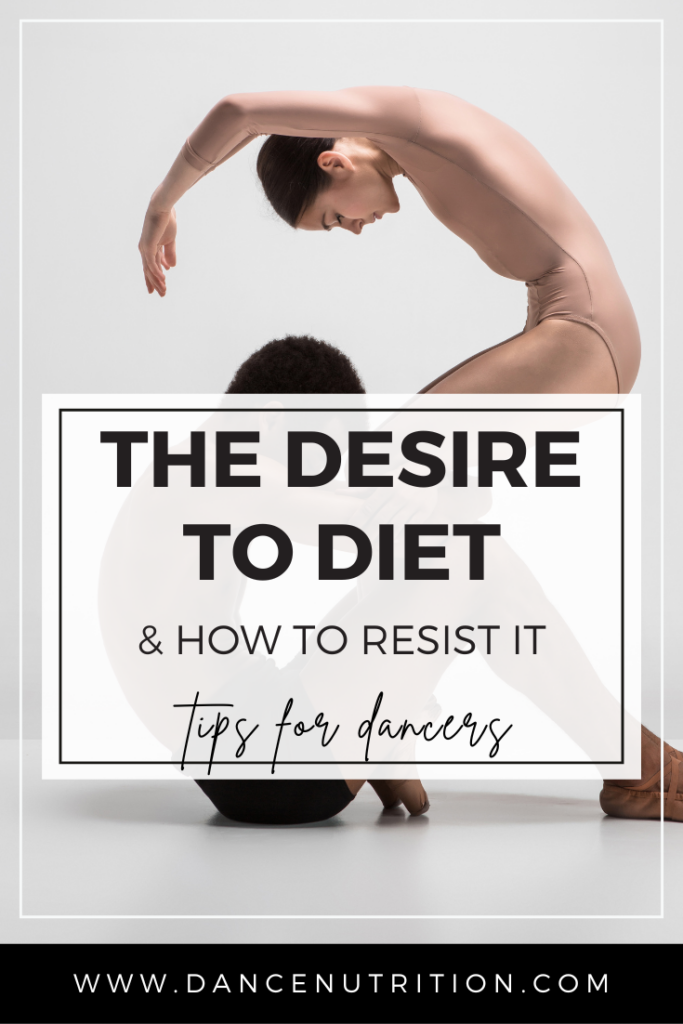As a dancer, you’re likely familiar with the unfortunate pressure of an industry that perpetuates a certain body shape or size. Whether for performance or aesthetics, the temptation to restrict food and diet can feel overwhelming. However, restrictive eating harmfully impacts your physical and mental well-being—hindering performance now and later.
Why Restrictive Eating is Harmful
Dancers need adequate fuel to support hours of training and performance. Restricting the amount and types of food eaten can lead to energy deficiency— a direct marker of reduced stamina, strength, and focus. Disruptions to your hormonal health also pursue, leading to issues like hypothalamic amenorrhea and weakened bone strength— a recipe for injuries like stress fractures. There’s also the impact on your relationship with food. Not eating enough can foster feelings of guilt and anxiety around food, contributing to disordered eating.
I’ve previously discussed why dancers are at an increased risk of disordered eating. In this blog post, we’ll explore a handful of affirmations and reminders to help you move through instances when you feel the urge to restrict your food.
Start here: Validation
Before jumping straight to affirmations, start by validating your experience. This allows you to dig deeper into why, helps to reduce the intensity behind them, and helps you shift from self-blame to self-compassion.
Do these feelings spike during times of stress? Is it a fear of losing control? Perhaps studio pressure or social media is to blame. By recognizing where these thoughts are coming from, you create space to address the underlying cause, rather than just reacting to the current emotion. Telling yourself, “It’s understandable I feel this way because…” is a great start. From there, consider if any of these feel relatable:
- ..restricting food gives short-term control, but it’s temporary.
- …my perception of my body size is skewed and hard to trust right now.
- …the thoughts I have about my body are not my own, but rather, passed down from a culture that glorifies an unhealthy ideal.
- …I am allowed to have thoughts of wanting to change my body without doing anything drastic.
20+ Reminders To Combat the Urge to Diet
From there, we want to replace these thoughts productively. Choose a handful that feel most impactful:
- My body deserves enough food for nourishment.
- I do not need to fix what’s not broken.
- I am worthy of care, and food is part of that.
- My well-being matters more than adhering to unrealistic body ideals.
- A well-nourished body helps me dance longer, stronger, and more powerfully.
- I can be a great dancer at many different body sizes.
- When thinking about the people I love most, I realize that their body weight, shape, and size have nothing to do with it.
- Dancing is about skill and artistry, not body shape or weight.
- Under-fueling will lead to burnout.
- When the messaging feels overwhelming, remember the basics: get more sleep and eat multiple meals and snacks daily.
- Eating enough is essential to keep my bones strong. Skipping meals increases the risk of stress fractures and injuries.
- I don’t need to shrink my body to feel confident in the mirror.
- I’ll pick up combinations faster with a well-fueled brain.
- I am allowed to enjoy food without guilt.
- Food is meant to be enjoyed, not feared.
- It sucks to feel bad about my body right now, but the alternative is an unsustainable, unhealthy weight.
- It’s okay if my body changes. Bodies naturally change over time, and that’s normal.
- My worth and capability is not tied to my weight.
- Comparing my body to others will only create self-doubt.
- Eating regularly helps me maintain my energy and avoid feeling sluggish.
- I am allowed to take up space, both on stage and in life.
- I deserve to eat foods I enjoy, without worrying about how they will affect my body size.
- Diet culture doesn’t serve dancers—it only leads to unnecessary stress.
- It’s ok if my focus is no longer intense meal prep and intense training routines.
Key Takeaways
While affirmations can be a powerful tool, it may take additional strategies to help resist the urge to restrict your diet. Getting support is your next step. Reach out to a trusted friend or family member. Or, seek a medical provider such as a Registered Dietitian Nutritionist and A mental health therapist. Shift your focus from how your body looks to how it feels and performs. Aim to build strength, flexibility, and endurance rather than change your weight.



